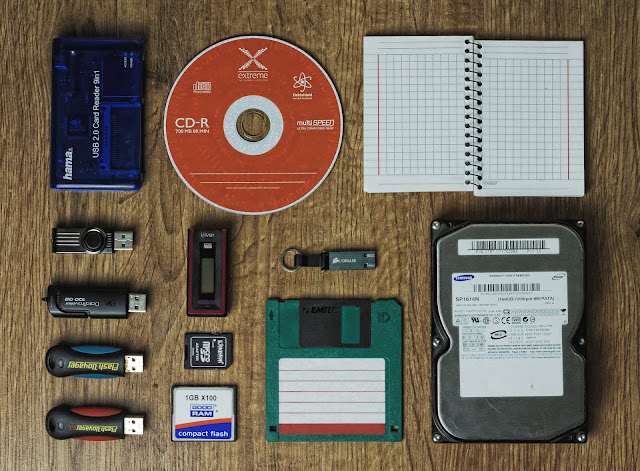Saturday, March 16, 2019
How reliable are SSDs? (Flash Drives or Thumb Drives)
The Brigham Young University Family History Library has accumulated a good-sized box of lost flash drives. Most of these were either dropped or left sticking into a USB port on one of the computers. I was reminded of this when I saw yet another dramatic drop in the prices of flash drives. You can now buy a 500 GB Flash Drive or SSD (Solid State Drive) for around $80. A 1 TB (Terabyte) Flash Drive is selling for around $230. Can you imagine losing that much information by simply forgetting to remove the drive from the public computer you have been using?
A Terabyte of information could be up to 17,000 hours of music, or 1000 hours of video, or 310,000 photos, or 500 hours of movies. See PC Ninja: How much can a 1 TB hard drive hold?
Most genealogists will probably never use up a 1 TB hard drive or SSD in their lifetime unless they spend a huge amount of time scanning photos or documents. Think about this. A 1 TB Flash Drive (SSD) would be equivalent of 754,297 3.5" Floppy Disks. Yes, that number is correct.
Now think about this. My entire genealogy file with all my sources, however excluding photos takes up about 10 MB. I could have 104,857 of my genealogy files on that a 1 TB Flash Drive. All of my programs and all the data on my main hard drive is less than 1.5 TBs.
Here is another thing to think about. I routinely backup my hard drives to an online service and I currently back up 8.5 TBs of information. It has taken me over 37 years of doing genealogy, writing, and scanning documents and photos to accumulate that huge pile. Can you partially understand why I would be concerned about backing up my data?
One of the things I think is most interesting about genealogists, besides the preponderance of older folks, is the preoccupation some of them have with the amount of storage space on their hard drives. Disk storage space is virtually unlimited for a very small investment.
That brings me to the reliability issue. Assuming I put all that stuff on some storage media, such as a flash drive, except for the distinct possibility of losing the drive, what is the risk of loss through a failure of the drive?
The answer to that question is rather simple: overall SSDs (including flash drives) have a failure rate of .5 % as opposed to a failure rate of 2 to 5% for spinning hard drives. See Enterprise Storage: SSD vs HD. This is why the cost factor is so important. Hard drives are still less expensive than solid-state drives for large capacities, but with the drop in prices of solid state devices, the advantage begins to disappear.
You can buy a 1 TB hard drive on Amazon for about $50. But a 2 TB hard drive is only about $60. You double the capacity for $10 more. Even if you jump to an 8 TB hard drive the price is only $140. Compare that to the prices above and you can see that the price of SSDs still has to come down some to be price competitive. But what about reliability? When you are talking about your hard-earned work product, I assume reliability would be more important than the small difference in price.
Can I afford to move to SSDs? I need at least an 8 TB drive to back up part of my data. What would that cost for an SSD? Well, that is the real difference. Right now, an 8 TB SSD is about $3,300. I am still waiting for the price drop.
Subscribe to:
Post Comments (Atom)





No comments:
Post a Comment